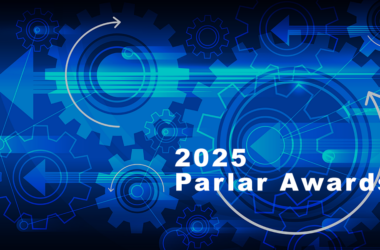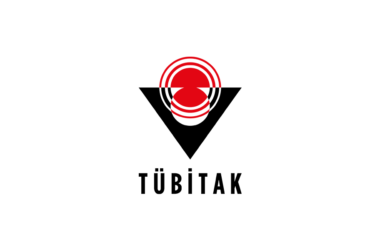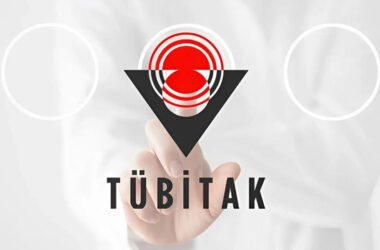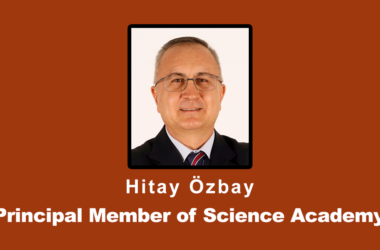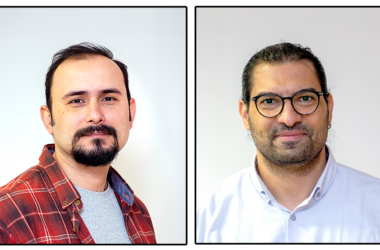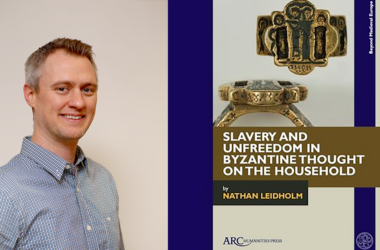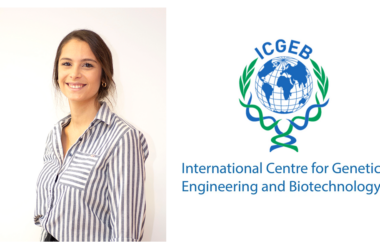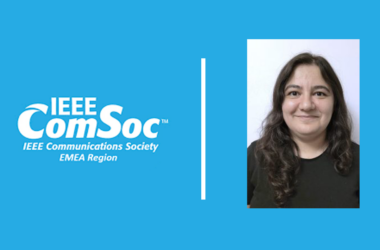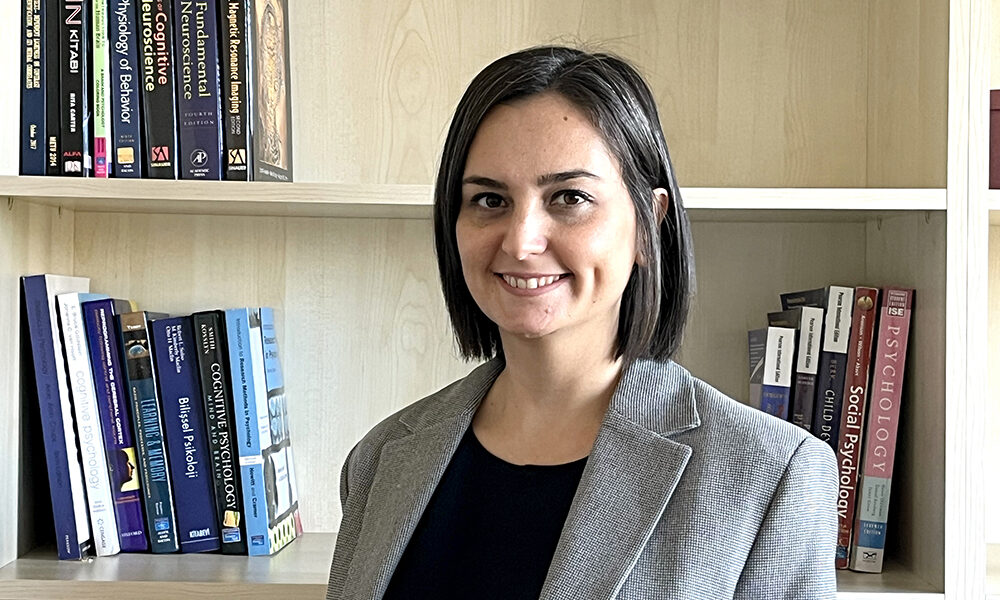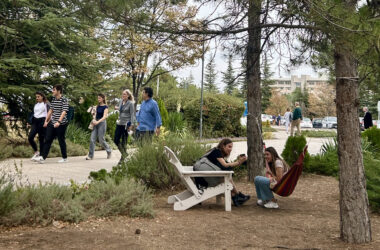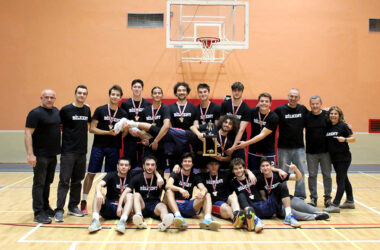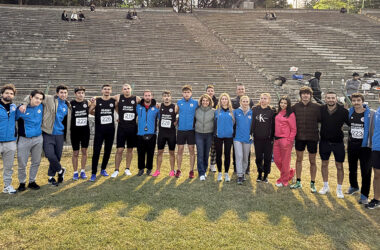BY EKİNSU POLAT (AMER/III)
Asst. Prof. Zahide Pamir, an accomplished neuroscientist and assistant professor in the Departments of Psychology and Neuroscience at Bilkent University, Ankara, Turkey, has an impressive academic and research background. After obtaining her PhD in Neuroscience from Bilkent University in 2017 and an MS in Cognitive Science from Middle East Technical University in 2014, Dr. Pamir worked as a postdoctoral research fellow at the Schepens Eye Research Institute, Massachusetts Eye and Ear, Harvard Medical School, from 2017 to 2022. Her research focuses on visual perception, cortical plasticity and cerebral visual impairment, contributing to numerous high-impact publications, including works in Cerebral Cortex, Developmental Medicine & Child Neurology, and NeuroImage: Clinical. She has also presented her research widely, including at the Vision Science Society Annual Meeting and the Human Brain Mapping conference. Recognized with honors like the Best Oral Presentation Award at the National Neuroimaging Conference in 2023 and a TÜBİTAK International Fellowship, Dr. Pamir continues to lead innovative research projects funded by institutions such as TÜBİTAK and the NIH. She also contributes to academia through her teaching, currently instructing courses in Cognitive Psychology and Quantitative Data Analysis at Bilkent University. Currently, she is teaching GE 512 (Quantitative Data Analysis) and PSYC 205 (Statistical Methods in Psychological Science II).
What’s the most common misconception about your work?
One of the most common misconceptions in my field, neuroscience, is that we only use 10% of our brain’s capacity. In reality, we utilize a significant portion of our brain’s regions, even when resting.
One aspect of my work involves investigating the impact of early brain damage on visual functioning. A common misconception in this area is the assumption of a direct relationship between the extent of structural brain damage and behavioral changes. However, structural abnormalities do not necessarily align with the presence or severity of behavioral issues. Significant structural damage can sometimes cause minimal behavioral effects, while subtle structural changes may lead to behavioral abnormalities that severely disrupt daily functioning.
What do you like to do when you are not working?
I enjoy doing jigsaw puzzles, reading thriller books and watching true crime documentaries.
Why did you choose an academic career? If you weren’t an academic, what career would you choose?
Initially, I intended to become an industrial and organizational psychologist so I decided to study psychology at Bilkent. However, at that time, I did not know anything about neuroscience. Studying at Bilkent introduced me to this fascinating field and this opportunity significantly shifted my interests and career path. Asking questions and designing appropriate experiments to understand how the brain processes information feels like solving a puzzle to me, and I find it deeply enjoyable. Therefore, I chose an academic career. If I hadn’t pursued an academic career, I would likely be working as an industrial-organizational psychologist for a private company.
What is the secret of leading a happy life?
What works for me is recognizing that happiness should depend on my effort rather than the outcomes. Since many factors are beyond my control, as long as I know I did my best, I can find happiness even when faced with negative outcomes.
What do you like the most about being at Bilkent?
Being surrounded by smart people and seeing a great variety of trees all the time.
What projects are you working on currently?
My recent studies focus on visual neuroplasticity, which is the brain’s ability to change. I work with neurotypical a.k.a. “healthy” participants to observe how the brain reacts to short-term changes. For example, I blindfold individuals for a brief period to see how their behavior and brain function change as a result of this temporary and reversible visual deprivation.
Additionally, I investigate the long-term visual neuroplasticity in two other populations: individuals with Cerebral Visual Impairment (CVI), a brain-based visual disorder associated with early brain injury, and adults born preterm. We aim to understand how visual information processing is affected when brain development is disrupted early in life.
If you had unlimited funds, what would you like to do research on?
There is a project that I admire called Project Prakash, initiated by Professor Pawan Sinha from MIT. India is home to the world’s largest population of children with treatable blindness. However, unfortunately, many of these children lack access to treatment due to insufficient resources.
The aim of Project Prakash is two-fold: to treat children with early blindness in India, the home country of Prof. Sinha, and to investigate how long-term visual deprivation and lack of visual experience affect visual processing once sight is restored. If I had unlimited funds, I would love to run a similar project, extending it to other treatable sensory deprivations and neurological conditions to explore the brain’s capacity for adaptation and change.
What has been the most exciting moment of your career so far? Could you share a turning point or defining moment in your career? What’s your best work?
During my graduate studies, my research focused on how fundamental visual properties are processed in the brain; therefore, my research questions were primarily driven by scientific curiosity. However, I always wanted to work on questions with practical implications as well. I wanted to make that shift during my postdoctoral studies and was fortunate to find that opportunity. I believe being accepted into a low-vision rehabilitation laboratory, and later into a visual neuroplasticity laboratory as a postdoctoral researcher, marked a turning point in my career for two main reasons.
First, there are not many other researchers with a basic science background working on clinical vision, which allowed me to bring a unique perspective to clinical studies and amplify their impact. As a result, I was able to publish significant papers that advanced the field. For example, I led two brain imaging studies using functional magnetic resonance imaging (fMRI) to understand how visual information processing is affected in cerebral visual impairment (CVI). These two studies are the only fMRI-based investigations into CVI, and their results provided critical insights into how the visual brain is impacted by this condition.
Second, in addition to the expertise in basic vision research I developed during my graduate studies, my postdoctoral experience provided me with valuable knowledge in low-vision rehabilitation, in working with individuals with visual impairments and in clinical vision research. The combination of these experiences has shaped my recent research interests within the domain of brain plasticity, focusing on how structural and functional changes occur in the brain due to new sensory experiences, physiological changes and injury throughout life.
